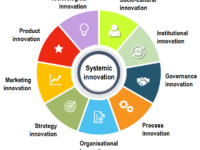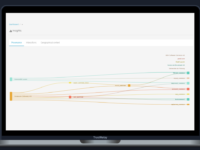Strategic planning has turned into bureaucracy circus, without really moving the needle. The City of Ashdod has pioneered a new strategic planning model, in collaboration with Insights.Us. The new methodology enables city leadership to define key measurable outcomes, harnessing cross-silos action plans. The digital platform was designed to celebrate success stories, and connect the community, allowing an inclusive whole-of-city approach.
Innovation Tag: Cross-Sector Partnerships
The hard-fought gains of democratization have come under attack in many countries. To reverse this trend, policymakers and civil society need new tools to navigate sophisticated forms of democratic erosion. We combine recent advances in machine learning with massive webscraping to produce high-frequency data and forecasts predicting where democratic backsliding will occur and the specific forms it will take. We equip pro-democracy forces with advanced warning to guide more strategic responses.
The rate of innovation often exceeds the speed at which regulatory systems can adapt, blurring lines between sectors and cutting across transitional regulatory and geographical boundaries. The RPF aims to keep the UK at the forefront of regulatory thinking and experimentation. It sponsors projects, led by regulators, aiming to help create a UK regulatory environment that encourages business innovation and investment. It is market-led and uses real-world innovation settings to deliver.
Becoming a circular economy entails a deep transformation of industry, consumer behavior and policy. Traditional innovation funding focuses on technology, punctual projects and (single) companies, which alone fail to bring the required systemic change. Hence, the Flemish government launches the subsidy programme Living Labs Circular Economy for projects tackling complex challenges, with a high ambition level, in co-creation with very diverse stakeholders and employing system innovation methods.
Since 2020, the City of Austin (COA) and the University of Texas (UT) have collaborated on over twenty diverse research projects under the legal and administrative framework of a five-year, ten million dollar master interlocal agreement (ILA). Among a very few of its kind in the USA, this ILA is an "innovation enabling innovation" that bridges the barriers between two large, extremely complex organizations and fast-tracks the launch of research and innovation projects by four to five times.
The Government of the city of Lucerne is piloting a new "digital cooperative" model, which allows public sector, private sector and citizens to contribute with data and get remunerated (financially or otherwise). Through this digital coopoerative, the population is able to tackle important and/or urgent issues that affect all its residents using data-driven decisions. For the initial stage, the data and issue tackled is related to mobility.
Case Study
Renovate or Rebuild: Using television to support the transition to sustainable housing in Australia

Renovate or Rebuild was a collaborative project that set out to increase the uptake of sustainable homes in the Australian residential sector. The show took an innovative approach to embed behavioural and building science into an engaging, yet informative and impactful TV series, that promoted and normalised sustainable homes. Research estimates this project could save Australians $600 million on their energy bills and would cost less than $1.60 for every tonne of greenhouse gas abated.
Impact Canada Challenges have incentivized innovative solutions in the areas of climate action, housing, food, and health. A quasi-experimental impact assessment approach uses tax data (available in most countries) to assess the effectiveness of Challenges by profiling Challenge participants and comparing business performance indicators of Challenge participants vs. non-participants. Requiring only the participant’s business number, this is a no burden, comparative, long-term measurement plan.
A problem for companies and owners of companies is that they need to engage with many different authorities to conduct their business. Instead of building solutions in a siloed approach we aim to build into the ecosystem by integrating different actors and enabling the business to control their own data using blockchains and digital wallets. This is both a new approach and use of a combination of new technologies that benefits the companies.
During the Russian invasion of Ukraine, relief organizations and government agencies lacked data about events on the ground and struggled to mount an effective response. New methods of event detection were urgently needed. A research team comprised of country experts and computational social scientists created a Twitter-based event detection system that provides geo-located event data on humanitarian needs, displaced persons, human rights abuses and civilian resistance in near real-time.





